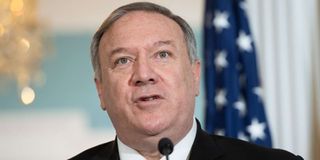US places Cuban bank on restricted list, citing military links

In this file photo taken on November 24, 2020, US Secretary of State Mike Pompeo speaks to the press prior to meeting with Kuwaiti Foreign Minister Sheikh Ahmad Nasser Al-Mohammad Al-Sabah at the State Department in Washington, DC.
Washington,
The United States on Friday placed a Cuban bank on a list of restricted entities, saying its profits "disproportionately benefit the Cuban military" and help fund "Cuba's interference in Venezuela."
The State Department announced the addition of the Banco Financiero International (BFI) to its Cuba Restricted List, which generally prohibits direct financial transactions with listed entities.
"BFI is a Cuban military-controlled commercial bank that benefits directly from financial transactions at the expense of the Cuban people" while giving "preferential access" to military and state companies, Secretary of State Michael Pompeo said in a statement.
Cuban Foreign Minister Bruno Rodriguez said in a tweet: "I reject new punitive measure of #US State Department to tighten blockade against #Cuba.
"The inclusion of Cuban entities in its lists is intended to reinforce an economic siege that has failed to destroy the Cuban Revolution after 62 years."
Terrorism
Washington's move came amid speculation that the Trump administration, in its waning days, is weighing whether to redesignate the island as a state sponsor of terrorism.
Such a move, which would severely impede foreign investment, could hinder the diplomacy of President-elect Joe Biden.
The State Department has drawn up a proposal to that effect, according to the New York Times, which said it was unclear if Pompeo would sign off on it.
Earlier in the week Rodriguez repeated a frequent complaint that the United States itself shelters "terrorist groups acting against Cuba."
Cuban-American anti-communist activists deny any wrongdoing.
US Representative Gregory Meeks, the incoming chairman of the House Foreign Affairs Committee, has warned Pompeo against making the terrorism designation.
"This would clearly be another stunt by President Trump and Pompeo, trying to tie the hands of the incoming Biden administration on their way out the door," he said.
A State Department spokesperson declined to comment on "potential deliberations regarding designations."
January 3 will mark the 60th anniversary of the United States severing relations with the island following its communist revolution.
Tensions eased under President Barack Obama, who established diplomatic relations and removed Cuba from the terror list in 2015.
Biden, who was Obama's vice president, has given only broad details of his Cuba policy but has indicated he would again relax some restrictions while still raising concerns on human rights.





